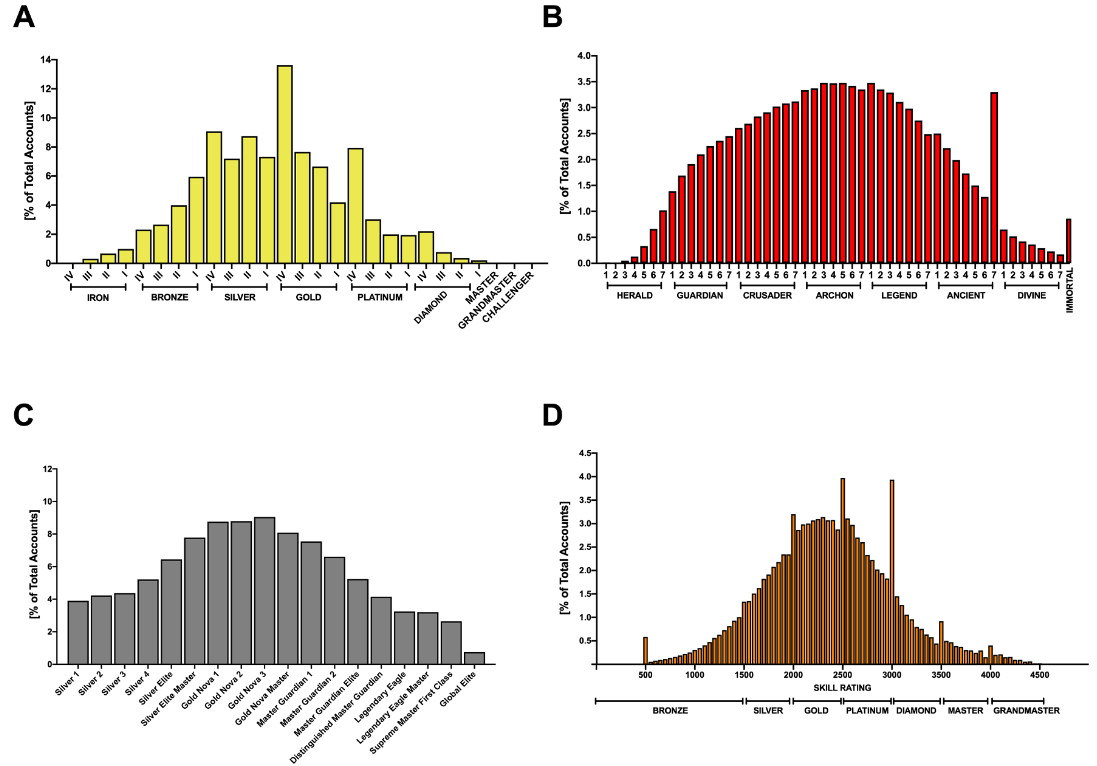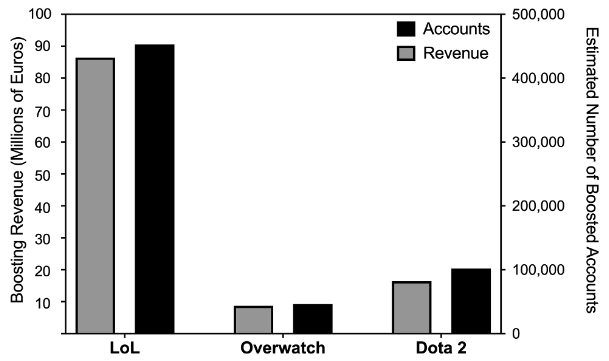Boosting: The Shadow Economy of Gaming

Hello everyone,
Welcome to a freshly squeezed episode of Gaming Science! Today, we’re tackling an issue in gaming which is probably as old as gaming itself—boosting. This form of cheating has far-reaching implications. We'll see how boosting affects players, teams, tournaments, and the broader gaming ecosystem.
• Boosting is a widespread form of cheating in esports, where higher-skilled players raise the ranks of lower-skilled accounts for money.
• Your rank is more than just numbers—it is prestige, a social currency, and can give you access to in-game rewards.
• The boosting "industry" generates over 111€ million annually across League of Legends, Overwatch, and Dota 2.
• Boosting creates a various problems for players and the community as a whole e.g., blocking players from ranking up, and skewing tournament results.
• Boosting also has positive aspects to it.
🆙 The Ranks We Go!
Boosting involves paying a high-skilled player to either log into a lower-ranked account or queue with a lower-ranked player to increase his rank. Boosting is prevalent across all major competitive games. For example, in Dota 2, there is an abnormal spike of players at the Ancient 7 rank (B), similar to Overwatch in Gold/Platinum (D). Also, in League of Legends, Gold IV players form an unusually large group (A). Unusual means that it is bigger than the official rank distribution would suggest. These anomalies are seen as evidence of rank inflation, often driven by boosting.

"The researchers found that competitive rankings are used by players participating in the online forum as a basis for lending weight to opinions expressed and as a form of social currency [1]."
In the gaming world, rank is a status symbol that makes a player appear more valuable. I bet we all agree that we would trust the opinion of someone (online or offline) with a higher rank more. As a result, the player becomes, in the eye of others, more trustworthy, credibility, and gains influence. But boosting isn’t just about prestige. Many tournaments use rank as a qualification criterion, meaning a boosted account can unfairly become eligible to compete, potentially skewing the results.
Another reason why people pay to have their account boosted are in-game rewards and decay. Boosting often spikes before the end of a ranked seasons when players want to "earn" the seasons' rewards—often tied to rank. Riot’s anti-cheat team found that 68% of boosted accounts were raised just enough to unlock the rewards, and/or to stay below the threshold for rank decay (ranking being lowered automatically for being inactive for too long). As you can imagine, this is another motivation for boosting for both parties. It's essentially paying for skins, wards, titles etc.
📊 The Scale of the Problem
The numbers are staggering. In League of Legends alone, 452,769 accounts—3.22% of all ranked accounts—were estimated to be boosted. Overwatch had 46,218 boosted accounts (3.46%), and Dota 2 had 101,851 boosted accounts (1.74%). On November 1, 2017, Riot Games identified 30,000 boosted accounts in LoL in just one day.

The practice of boosting is as widespread as it is lucrative. If there wasn't a market for it—supply and demand—there wouldn't be much boosting. Instead, there is good money to be made.
"... we estimated that potential boosting industry revenue in the three games combined is approximately €111,566,660 (LoL, €86,446,224; Overwatch, €8,707,529; Dota 2, €16,412,907)."
💢 The Impact on Players and Competition
Boosting undermines ranking systems as a whole, as they are designed to reflect skill, and ensure a fair competition. However, boosting creates a "Gatekeeper effect", where boosted accounts occupy higher ranks, blocking genuinely skilled players from advancing. Let's say you and your buddy are stuck in "Elo Hell". He gets his account boosted and you become better at the game. He is now—undeserving—blocking and denying you the opportunities to rank up.
The consequences extend to the professional scene. Many high-level esports players rely on ranked matches for practice and exposure. Boosted accounts ruin the fun and quality for everyone—the player doesn't get good practice, and the viewers bad games. As a consequence, pro players look for better environments. For instance, South Korea, is known for its strict anti-boosting measures, and has become a hub for progamer due to its high-quality ranked environment.
"Another potential impact of boosting may be observed on tournament play. Many lower level esport competitions are “open entry” to qualifying individuals and teams, and ranking is often the sole qualification criterion for individuals [1]."
Many players outside top-tier teams lack regular income from contracts and sponsors. To make up for it, they rely to participating in smaller tournaments. Boosted accounts may take up a spot for someone who would genuinely—due to their skill—be eligible to participate. This creates unnecessary pressure on amateur players.
🛡️ Fighting Back
Game developers and governments have implemented several measures to combat boosting. Here are some examples:
- Riot Games added "rank decay," which penalizes inactivity. The idea behind it is so that boosted accounts cannot simply "sit" on their rank without every playing again. Additionally, limits on rank differences between queuing players have made "queue boosting" more difficult.
- Blizzard Entertainment is known for their "ban waves," purging large groups of boosted accounts.
- South Korea has taken the fight against boosting to another level, criminalizing it entirely. Boosters face fines of up to $18,000 and a two-year suspended jail sentence.
🤔 What Can We Learn?
First, I think it is valuable to acknowledge that boosting is bad overall. We touched on some of the aspects above, but even players (81.5% of a survey among LoL players) agreed that boosting has a negative impact on the LoL community.
Second, if you hand over your account to a booster and pay him, you cannot be sure that he won't sell your account or data. How could you know that the boosters isn't selling your data (bank account info, full name etc.) on the dark web to make some additional money?
Lastly, it would also be a fair argument to say that boosting is nothing but a service you buy. By doing that, you probably support people in third-world countries that otherwise would have no or fewer income. A famous example of that are the infamous gold farmers that exist(ed) in World of Warcraft for many years.
Wish ya'll a great week. Best,
Christian 🙂







